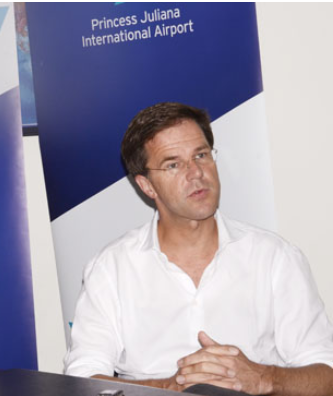The St. Maarten newspaper Today reported yesterday that Telegraaf-journalist Ruud Mikkers, who toured the Antilles last week with Prime Minister Mark Rutte and a trade mission caused quite a stir in the Netherlands on Saturday with a front-page story under the ominous headline “Antilles on the line” (Antillen op de wip) that suggested that as far as Rutte is concerned the autonomous countries and the BES-islands could severe their ties with the Netherlands immediately if they wanted to.

Mikkers reported that Rutte made the remark “behind the scenes” and that island-politicians had looked at him rather surprised when they heard his opinion. “If you call me tomorrow that you want out, we will immediately take care of it,” the Dutch Prime Minister was quoted as saying.
The story triggered more than 300 reactions on the online edition of the newspaper; quite some readers pointed out that it is up to the islands to take a decision about their status within or outside the Kingdom. Others cheered the statement and demanded that the Netherlands “stops the development aid” and that if the countries want to be independent they have to stand on their own feet. In reality, Rutte said already at a press conference on Wednesday, that the book on debt relief (perceived as development aid in the Netherlands) is closed.
Tom-Jan Meeus brought Rutte’s statement with the correct nuance. “Prime Minister Rutte told the islands in Caribbean Netherlands this week behind the scenes that if they wish to do this, they are able to leave the Kingdom at any moment: “they looked at me with surprise. I said: if you want out, and a majority of your population supports that, then it is possible. Then you give me a call and we arrange it.”
On Wednesday, Rutte said at a press conference in Philipsburg that he does not want to talk about constitutional reform anymore. Meeus quoted him as saying: “I said in private: if we ever talk about policy, I’ll only do it if you want to get out of the Kingdom.”
The Dutch daily Trouw picked up the story and quoted a reaction from D66-leader Alexander Pechtold, who once told this newspaper that St. Maarten is “not on the radar” of politicians in The Hague. Pechtold told the NOS that Rutte’s statement is “for a historian improper, and for a prime minister not very diplomatic.” According to the D66-leader, Rutte’s words were meant for the home front “because he knows people like to hear this.”
The Netherlands has a history of 400 years with the islands and the prime minister has a duty to put his thoughts carefully into words ad something like this about Limburg, all hell would have broken loose.”
NRC Handelsblad reported that Rutte saved his harshest criticism for St. Maarten where he “made agreements about a thorough investigation into the government’s integrity.” The story fails to report that Rutte appreciated the fact that Prime Minister Sarah Wescot-Williams had already taken the initiative to contact anti-corruption Watchdog Transparency International for a national integrity assessment.
Tom-Jan Meeus furthermore writes that the minister of justice had to step down “because he turned out to be the manager of several brothels.” It also appeared, Meeus wrote, that the island’s parliamentarians have a monthly salary of €9,000 ($10,800), “the highest in the Kingdom.” According to Meeus Rutte recommended that the parliament reopen the debate about this issue. However, at Wednesday’s press conference, Rutte emphasized that it was not up to him to comment on the salaries. Today already revealed the salaries shortly after the territory obtained country status in October 2010.
In their Editorial Today added:
The fuss in the Netherlands about the position of the Caribbean islands in the Kingdom is a typical piece of non-news. Prime Minister Rutte simply stated a fact, and there is nothing new about it.
Apparently Dutch journalists have not considered the right to self-determination that belongs to all people. The people of St. Maarten decide about their destiny, not the Prime Minister of the Netherlands.
It is absolute nonsense to suggest, as the Telegraaf did on Saturday, that the islands’ position in the Kingdom is on the line. The Dutch have no authority to kick out St. Maarten or any of the other islands, and the Dutch government has nothing to say about any decisions the islands may take in the future about this issue.
Reading the reactions in the on-line Telegraaf makes clear why this story became a (non)-issue: this is what people in the Netherlands want to hear, even though many of them have never been to the Antilles and could not pinpoint St. Maarten on a map even if you promised them a million dollars,
After all, it is the silly season in the Netherlands and newspaper readers are entitled to some excitement. Anything will do.
End of the Editorial of newspaper Today
The Curacao Chronicle also published an article on this subject by the hand of Emile van Outeren (NRC):
Completely independent? We can arrange that easily, says Prime Minister Rutte to the Antillean politicians. But it’s not that simple. The U.S. is against it.
Content wise was Rutte’s message to politicians in the West Indies not so special. If the Caribbean islands wants to be fully independent, they are free to do so. Netherlands cannot kick them out of the Kingdom, but they can get out of it themselves. Under international law, the choice is up to them.
“If you want out, and a majority of your population supports that, then that is possible,” said Prime Minister Mark Rutte during his trip to Aruba, Curaçao, Sint Maarten, Bonaire, Saba and St. Eustatius. He mentioned this behind the scenes during “robust discussions” with local administrators and then repeated in this paper. So far no controversy.
But the way Rutte spoke out, is remarkable. To politicians who may want to cut the ties he said, “you just call me and we will arrange that.” Like it’s nothing.
It also led to reactions. Alexander Pechtold, leader of D66 and former Minister of Kingdom Relations, called the statements on Radio 1 “for the historian Rutte inappropriate and for a Prime Minister also little diplomatic”. He accused the Prime Minister of “populist tendencies”. Rutte made that comment just to be popular in his own country, but with it he ignored 400 years of history between the countries.
Rutte also stressed that the Netherlands is no longer prepared to reach to its pocket if the Caribbean islands get into trouble. There is the image that there are still too much Dutch money that goes to the six islands, but that’s no longer the case since 2010. Three years ago the country the Netherlands Antilles was dissolved and Curaçao and Sint Maarten gained a country status, like Aruba, within the Kingdom. The smaller islands of Bonaire, Saba and St. Eustatius became municipalities of the Netherlands. Netherlands paid the arrears of the Antilles, nearly 2 billion, but is discontinuing subsidy programs. They did keep a watchful eye on the finances and administration of the islands.
That last one became an issue, especially in Curaçao, which was placed last year under guardianship by the Netherlands because of financial mismanagement. Politicians in Curacao, the late Helmin Wiels first, used a possible independence from the Netherlands in their campaigns. They acted against the old colonial power, but in fact no one has acted on the exit from the Kingdom. Since Wiels’ independence party became the largest on the island, he pushed the idea of independence decades ahead. After he was shot in May, the topic was completely forgotten.
Referendums have shown that most islanders do not want to separate from Netherlands. They distrust their politicians and they cherish their Dutch passport, even though the bill initiative presented by member of Parliament for VVD, André Bosman makes access to the Netherlands difficult for the people of the former Netherlands Antilles.
Rutte, who visited the islands for the first time during his premiership, made it sound simple to cut off ties with the Netherlands. But the great ally, the United States will try to prevent that. The Netherlands is responsible for foreign policy and defense of all the islands in the kingdom structure. Nowhere outside the Netherlands are there more Dutch soldiers than on the Caribbean islands, especially to combat the drug trafficking between North and South America. The fear is great that the drug mafia will take over all the islands if the Netherlands is no longer responsible for them.
 Archive of posts from Saba-News.com Archive Saba News
Archive of posts from Saba-News.com Archive Saba News
